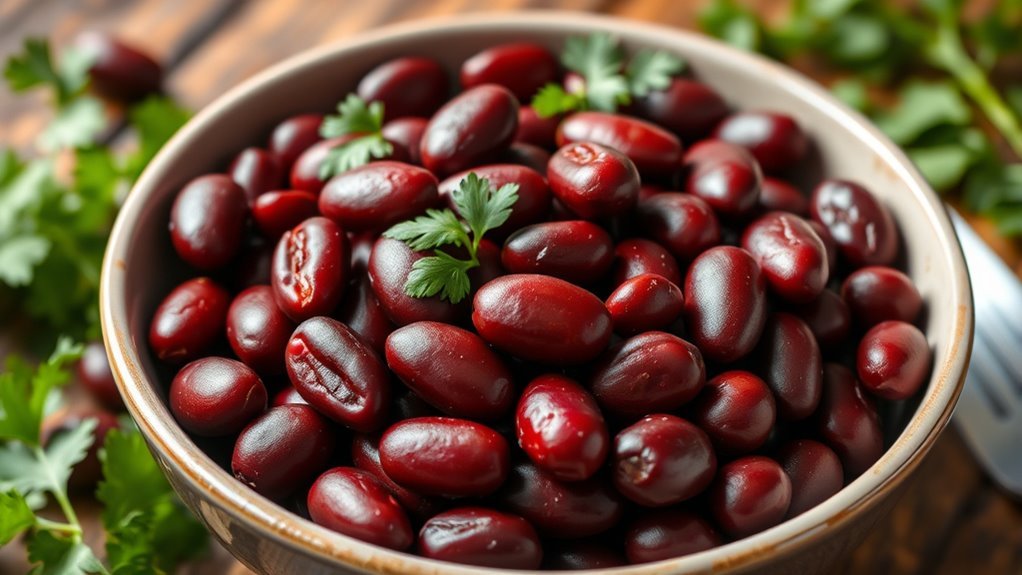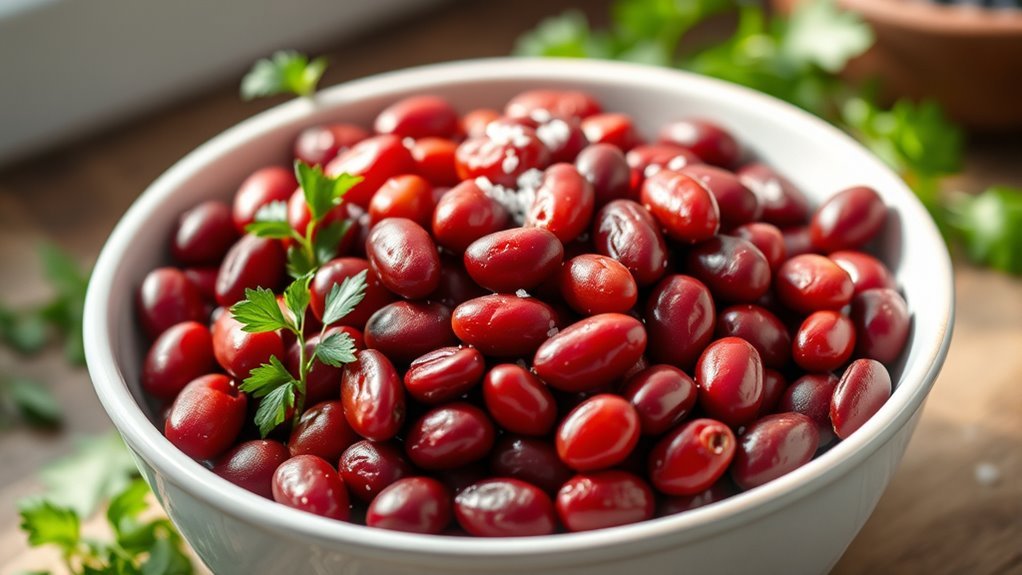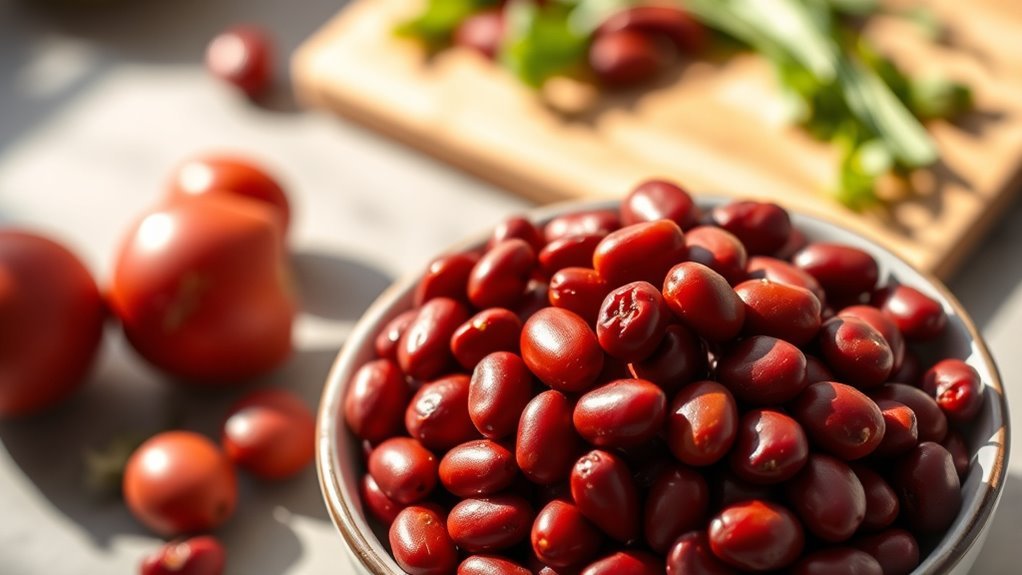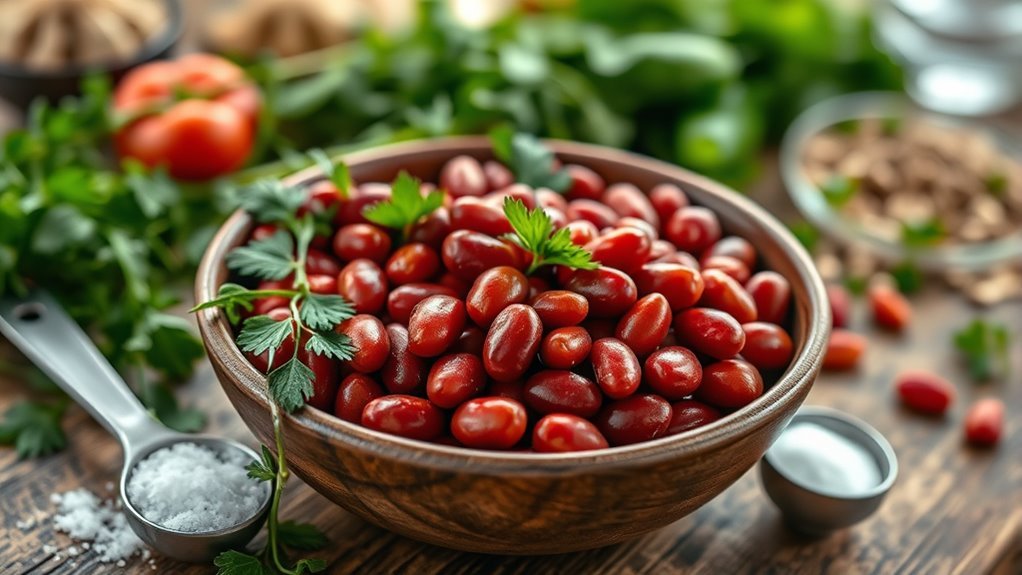Kidney beans aren’t considered keto-friendly due to their high carbohydrate content, with around 20 grams per standard serving. This can disrupt ketosis, which typically requires limiting carbs to under 50 grams daily. While they offer health benefits, like fiber and protein, portion control is essential if you choose to include them. Alternatives like black soybeans or green beans might be better suited for your ketogenic goals. There’s more to explore about balancing meals while staying in ketosis.
Understanding the Ketogenic Diet

The ketogenic diet, often simply called keto, is a high-fat, low-carbohydrate eating plan designed to shift your body into a state of ketosis, where it burns fat for fuel instead of carbohydrates. Embracing the ketogenic principles involves drastically reducing your carb intake while increasing your consumption of healthy fats. This alteration promotes fat adaptation, enabling your body to efficiently utilize stored fat for energy. As you change into ketosis, you might experience enhanced mental clarity and stable energy levels, liberating you from the energy crashes linked to high-carb diets. Understanding these principles not only empowers you to make informed choices but also fosters a sense of freedom as you explore dietary options that align with your health goals and lifestyle. Additionally, it’s important to note that not all high-fat foods are beneficial for everyone, highlighting the need for personalized dietary strategies.
Nutritional Profile of Kidney Beans

Kidney beans are a nutrient-dense legume that offers a variety of health benefits, though their suitability for a ketogenic diet is often debated. They’re packed with essential nutrients that can support overall health. Here’s a quick look at their nutritional profile:
| Nutrient | Amount per 100g |
|---|---|
| Protein | 8.7g |
| Fiber | 6.4g |
| Iron | 2.9mg |
| Folate | 130µg |
The nutritional benefits of kidney beans include high protein content, which aids in muscle maintenance, and fiber, promoting digestive health. While they offer essential vitamins and minerals, you’ll need to evaluate how they fit into your individual dietary goals, especially on a keto diet.
Carbohydrate Content in Kidney Beans

While many legumes are celebrated for their nutritional benefits, the carbohydrate content in kidney beans can present a challenge for those adhering to a ketogenic diet. A standard serving of kidney beans contains about 20 grams of carbohydrates, which can greatly impact your daily carb limit on keto. For someone aiming for under 50 grams of carbs per day, this amount is considerable. If you’re looking for low-carb bean alternatives, options like black soybeans or edamame may be more suitable, as they contain fewer carbohydrates and can fit better within your dietary goals. Understanding the carb content in your diet is essential for maintaining ketosis, so consider these alternatives if you’re committed to a strict ketogenic lifestyle.
Impact on Blood Sugar Levels
When considering the impact of kidney beans on blood sugar levels, it is crucial to look at their glycemic index, which reflects how food affects your blood glucose. With a low glycemic index, kidney beans can lead to a slower insulin response, making them a potentially beneficial choice for those monitoring their blood sugar. Understanding these factors can help you make informed dietary decisions while on a keto diet.
Glycemic Index Overview
Understanding the glycemic index (GI) is essential for managing blood sugar levels, especially for those following a keto diet. The GI ranks foods based on their impact on blood sugar, which can influence your dietary choices. Here are four key points to contemplate:
- Low GI Foods: Typically score 55 or less, causing gradual blood sugar increases.
- Moderate GI Foods: Score between 56-69, leading to a moderate rise in blood sugar.
- High GI Foods: Score 70 or above, resulting in rapid spikes in blood sugar levels.
- Keto-Friendly Choices: Foods with low GI are encouraged to maintain stable blood sugar.
Insulin Response Considerations
The glycemic index provides valuable insight into how different foods affect blood sugar, but it’s also important to take into account the insulin response triggered by these foods. Kidney beans, while low on the glycemic index, can still influence blood glucose levels differently based on individual insulin sensitivity. Higher insulin sensitivity means your body can manage blood sugar better, making kidney beans a more suitable option for some.
| Food | Glycemic Index | Insulin Response |
|---|---|---|
| Kidney Beans | 24 | Moderate |
| White Rice | 73 | High |
| Broccoli | 15 | Low |
Understanding these responses can help you make informed choices that align with your dietary goals.
How Kidney Beans Affect Ketosis
How do kidney beans impact your state of ketosis? While they’re a nutritious option, kidney beans can hinder your ketosis effects due to their higher carbohydrate content. If you’re considering incorporating them into your diet, here are some factors to think about:
Kidney beans may hinder ketosis due to their higher carb content, so monitor your intake carefully.
- Carb Count: Kidney beans contain around 20 grams of carbs per cup, which can quickly add up.
- Fiber Benefits: While high in fiber, it may not offset the carb load for ketosis enthusiasts.
- Insulin Response: They can trigger insulin spikes that disrupt ketosis.
- Bean Alternatives: Consider options like cauliflower or zucchini for lower-carb substitutes.
Additionally, understanding carbohydrate content is essential for making informed decisions about including beans in your keto meal plan.
Ultimately, if you’re aiming for freedom in your keto journey, it’s essential to monitor your carb intake closely.
Alternatives to Kidney Beans on Keto
If you’re looking for alternatives to kidney beans while following a keto diet, there are several options worth considering. Low-carb bean substitutes like black soybeans can provide a similar texture without the carbs, while high-fiber vegetables like zucchini and cauliflower can serve as excellent replacements in various dishes. Additionally, incorporating other high-fiber keto foods can help you maintain satiety and support your dietary goals. It’s important to remember that monitoring intake is crucial to stay within carb limits and achieve ketosis.
Low-Carb Bean Options
While kidney beans are a staple in many diets, they aren’t the best choice for those following a ketogenic lifestyle due to their relatively high carbohydrate content. Fortunately, there are low-carb bean alternatives that can fit into your diet. Here are four low-carb legumes you might consider:
- Black Soybeans – High in protein and fiber, they’re a great substitute.
- Green Beans – Technically a legume, they’re low in carbs and versatile.
- Mung Beans – Packed with nutrients, they offer a unique taste without the carbs.
- Edamame – Young soybeans that provide protein while keeping carbs low.
These options allow you to enjoy bean alternatives without compromising your keto goals. Including low-carb beans in your meals can enhance dietary variety while supporting keto goals.
Vegetable Substitutes for Beans
For those on a ketogenic diet seeking alternatives to kidney beans, vegetables can provide a satisfying and nutritious substitute. Some excellent vegetable alternatives include cauliflower, which can be riced or mashed, and zucchini, which can be spiralized or sautéed. These options are low in carbs and high in fiber, making them perfect bean replacements in various dishes. Additionally, mushrooms offer a hearty texture and can absorb flavors well, enhancing your meals. Broccoli and spinach are also great choices, adding essential nutrients and vibrant colors to your plate. By incorporating these vegetable substitutes, you can enjoy the versatility of beans while staying aligned with your keto goals, allowing for creativity and freedom in your meal planning. Furthermore, utilizing leafy greens not only provides additional fiber but also enhances the nutritional profile of your dishes.
High-Fiber Keto Foods
When you’re following a ketogenic diet, finding high-fiber foods that can replace kidney beans is essential for maintaining digestive health and satiety. Luckily, there are plenty of fiber-rich foods that align with a keto lifestyle. Here are four excellent alternatives:
- Chia Seeds: Packed with omega-3s and about 10 grams of fiber per ounce.
- Avocado: A creamy delight offering around 10 grams of fiber in a medium fruit.
- Flaxseeds: Containing about 8 grams of fiber per ounce, they’re perfect for adding to smoothies or baked goods.
- Psyllium Husk: A soluble fiber that can help with digestion, offering nearly 7 grams per tablespoon.
Incorporating these high-fiber options not only supports your digestive health but also enhances the overall benefits of your keto journey. Additionally, chia seeds are a versatile ingredient that can be easily added to various meals, making them a nutritious choice on a keto diet.
Incorporating Kidney Beans in Moderation
Incorporating kidney beans into a keto diet can be a balancing act, as their carbohydrate content may challenge your state of ketosis. However, with proper portion control and dietary balance, you can enjoy them in moderation. Here’s a quick look at how to fit kidney beans into your meals without derailing your keto goals:
| Portion Size | Carbohydrates (g) | Suggested Uses |
|---|---|---|
| ¼ cup | 10-15 | Salads, Soups |
| ½ cup | 20-30 | Side Dish, Chili |
| 1 cup | 40-60 | Main Course, Stews |
Cooking Tips for Keto-Friendly Meals
While maneuvering through the keto diet, it is essential to focus on cooking techniques that maximize flavor without compromising your carbohydrate limits. Here are some essential tips for successful keto meal prep and recipe variations:
- Use healthy fats: Incorporate oils like olive or avocado for sautéing or dressing.
- Experiment with spices: Enhance your meals with herbs and spices, avoiding sugar-laden sauces.
- Opt for low-carb substitutes: Replace traditional grains with cauliflower rice or zucchini noodles.
- Batch cook: Prepare large portions to simplify keto meal prep, ensuring you always have keto-friendly options on hand. Additionally, incorporating non-starchy vegetables into your meals can boost nutrition and help keep you full.
Health Benefits of Kidney Beans
Kidney beans are packed with essential nutrients that can greatly enhance your overall health. Their high fiber content supports digestive health, while various compounds promote heart health by lowering cholesterol levels. Incorporating kidney beans into your diet can offer these benefits, making them a valuable addition to your meals.
Nutrient-Rich Profile
Beans are often celebrated for their impressive nutrient profile, and kidney beans are no exception. They offer numerous health benefits that can enhance your well-being. Here’s what you’ll gain from incorporating them into your diet:
- High Fiber Content: Promotes nutrient absorption and aids digestion.
- Rich in Protein: Supports muscle growth and repair.
- Low Glycemic Index: Helps manage blood sugar levels effectively.
- Antioxidants: Combat oxidative stress, enhancing metabolic benefits.
Heart Health Support
Incorporating kidney beans into your diet not only boosts your nutrient intake but also plays a significant role in supporting heart health. These legumes are rich in fiber, which helps lower cholesterol levels—an essential factor in maintaining cardiovascular health. Studies suggest that a high-fiber diet can reduce the risk of heart disease, making kidney beans a smart choice for your meals. Additionally, the antioxidants and phytochemicals found in kidney beans can combat inflammation, further promoting heart health. With their low glycemic index, kidney beans also help stabilize blood sugar levels, which is vital for overall well-being. By enjoying kidney beans, you’re not just savoring a nutritious food; you’re also reaping kidney benefits that can enhance your heart health.
Digestive Health Benefits
While many people focus on the protein content of legumes, the digestive health benefits of kidney beans are equally significant. These beans are packed with fiber, which supports gut health in several ways:
- Promotes Regularity: The high fiber content helps keep your digestive system moving smoothly.
- Prebiotic Properties: Kidney beans act as food for beneficial gut bacteria, enhancing your microbiome.
- Reduces Bloating: Adequate fiber intake can help alleviate feelings of fullness and discomfort.
- Stabilizes Blood Sugar: Fiber slows down digestion, which can prevent blood sugar spikes, benefiting overall health.
Incorporating kidney beans into your meals can enhance your gut health while enjoying the fiber benefits. So, consider adding them to your diet for a tasty and nutritious boost!
Real-Life Keto Meal Ideas With Kidney Beans
Kidney beans can be a surprising addition to your keto diet, offering both flavor and nutrition. When meal prepping, consider a hearty chili with ground beef, kidney beans, and low-carb vegetables. This dish not only satisfies but also provides protein and fiber. Another option is a kidney bean salad, mixed with avocado, olives, and feta cheese for a revitalizing lunch. For those seeking comfort food, try a layered keto casserole featuring kidney beans, cheese, and spices. These real-life keto recipes demonstrate that you can enjoy diverse flavors while sticking to your dietary goals. Just remember to balance your portions, as kidney beans do contain carbs. Incorporating lower carb options can help you maintain your energy levels while enjoying satisfying meals that align with your keto lifestyle! Embrace your freedom to create satisfying meals that align with your keto lifestyle!
Frequently Asked Questions
Can Kidney Beans Cause Digestive Issues on a Keto Diet?
Kidney beans can indeed cause complications in your digestive health, especially on a keto diet. Packed with fiber, they may lead to bloating or gas for some individuals. If you’ve got a sensitive stomach, it’s wise to approach kidney beans cautiously. While they’re nutritious, their carbohydrate content can also disrupt your ketosis goals. So, if you’re seeking a smooth-sailing diet, consider alternatives that align better with your digestive needs and keto lifestyle.
Are Canned Kidney Beans Suitable for a Keto Lifestyle?
Canned kidney beans aren’t typically suitable for a keto lifestyle due to their nutritional composition. They contain about 20 grams of carbs per cup, which can hinder ketosis. While their fiber content is beneficial for digestion, the net carbs might be too high for strict keto followers. If you’re looking for low-carb options, consider alternatives like green beans or zucchini that align better with your dietary goals while still offering freedom in your choices.
How Do Kidney Beans Compare to Other Legumes on Keto?
When it comes to legume comparisons, kidney beans aren’t the best choice for keto. They’re higher in carbs than other legumes, like green beans or black soybeans, which are better keto alternatives. While kidney beans provide protein and fiber, they can kick you out of ketosis if you’re not careful. Remember, “You can’t have your cake and eat it too.” So, if you’re aiming for a strict keto diet, consider those lower-carb options.
Can I Eat Kidney Beans While Intermittent Fasting?
Yes, you can eat kidney beans while intermittent fasting, but it’s best to do so during your eating window. Kidney beans are nutritious and provide protein, fiber, and essential vitamins. However, their carbohydrate content might not align with strict fasting goals if consumed outside your eating hours. Focus on portion control and consider how they fit into your overall dietary plan, ensuring you maintain the balance you’re aiming for during your fasting regimen.
What Are the Best Methods to Prepare Kidney Beans for Keto?
Looking to prepare kidney beans in a keto-friendly way? First, consider using preparation techniques like soaking them overnight to reduce lectins and cooking time. You can then boil or pressure cook them until tender. Adding spices like cumin or chili can enhance flavor without adding carbs. Remember to portion control, as beans can be higher in carbs than other keto-friendly foods. So, what’s your favorite way to spice things up in the kitchen?


